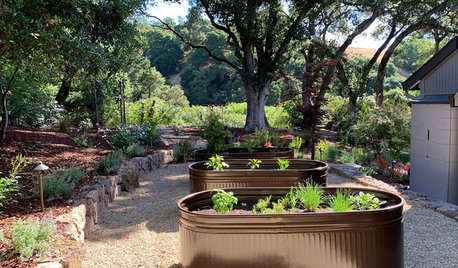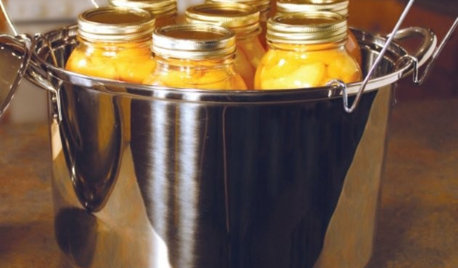Need tomato advice
veicken
10 years ago
Related Stories

EDIBLE GARDENSSummer Crops: How to Grow Tomatoes
Plant tomato seedlings in spring for one of the best tastes of summer, fresh from your backyard
Full Story
FARM YOUR YARDAdvice on Canyon Farming From L.A.'s Vegetable Whisperer
See how a screened garden house and raised beds help an edible garden in a Los Angeles canyon thrive
Full Story
KITCHEN DESIGN3 Steps to Choosing Kitchen Finishes Wisely
Lost your way in the field of options for countertop and cabinet finishes? This advice will put your kitchen renovation back on track
Full Story
FARM YOUR YARD6 Things to Know Before You Start Growing Your Own Food
It takes time and practice, but growing edibles in the suburbs or city is possible with smart prep and patience
Full Story
EDIBLE GARDENSGarden BFFs? Why Your Vegetables Are Begging for Companion Plants
Foster friendships among plants for protection from pests, pollination support and color camaraderie
Full Story
PRODUCT PICKSGuest Picks: Canning, Preserving, Steaming, Dehydrating
20 products to help make fall produce last through the season and beyond
Full Story
BUDGET DECORATINGEasy Ways to Hide Your Home's Flaws
Clever concealing and distracting tactics help put your home's best face forward
Full Story
KITCHEN DESIGN12 Farmhouse Touches That Bring Homeyness to a Kitchen
Shaker cabinetry, country-store-inspired hardware, barn elements or a key piece of art will add homestead appeal to your kitchen
Full Story
GARDENING AND LANDSCAPINGWorld of Design: 10 Home Gardeners Show Us Their Sweet Summer Harvests
From New York to Tokyo, these gardeners have turned their yards, terraces and rooftops into places of bounty
Full StoryMore Discussions







myfamilysfarm
2ajsmama
Related Professionals
Rancho Cordova Landscape Architects & Landscape Designers · Edmond Landscape Contractors · Fort Myers Landscape Contractors · Fort Wayne Landscape Contractors · Hickory Hills Landscape Contractors · Holtsville Landscape Contractors · Plantation Landscape Contractors · Quincy Landscape Contractors · Ringwood Landscape Contractors · Seymour Landscape Contractors · Northlake Landscape Contractors · Crowley Landscape Contractors · Columbia Roofing & Gutters · Rome Roofing & Gutters · Conroe Driveway Installation & Maintenancereadinglady
digdirt2
myfamilysfarm
veickenOriginal Author
veickenOriginal Author
digdirt2
veickenOriginal Author
readinglady